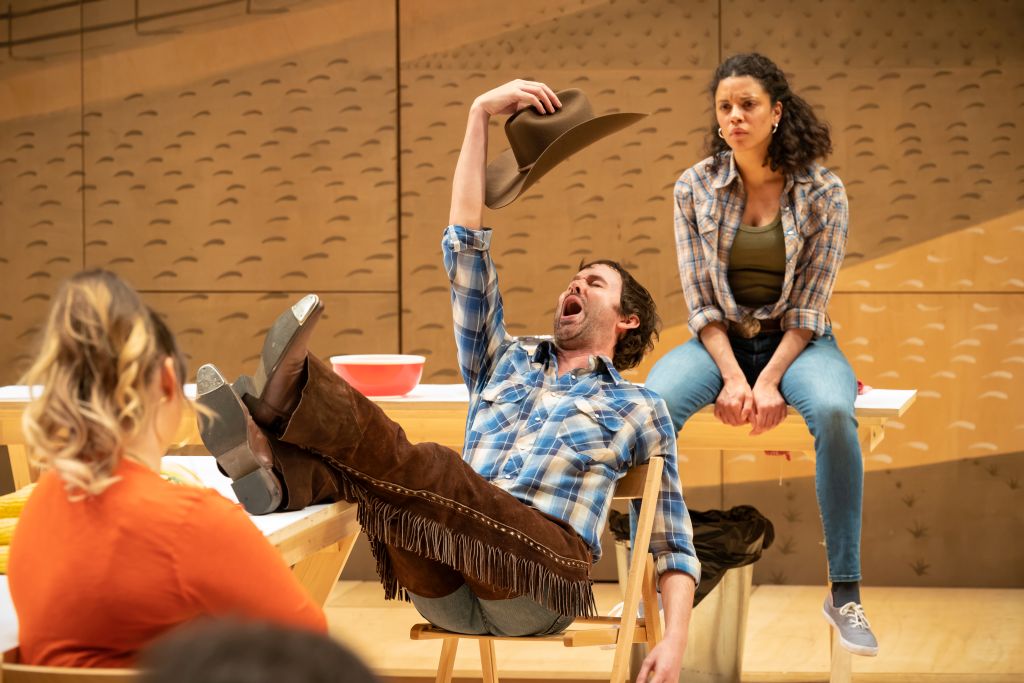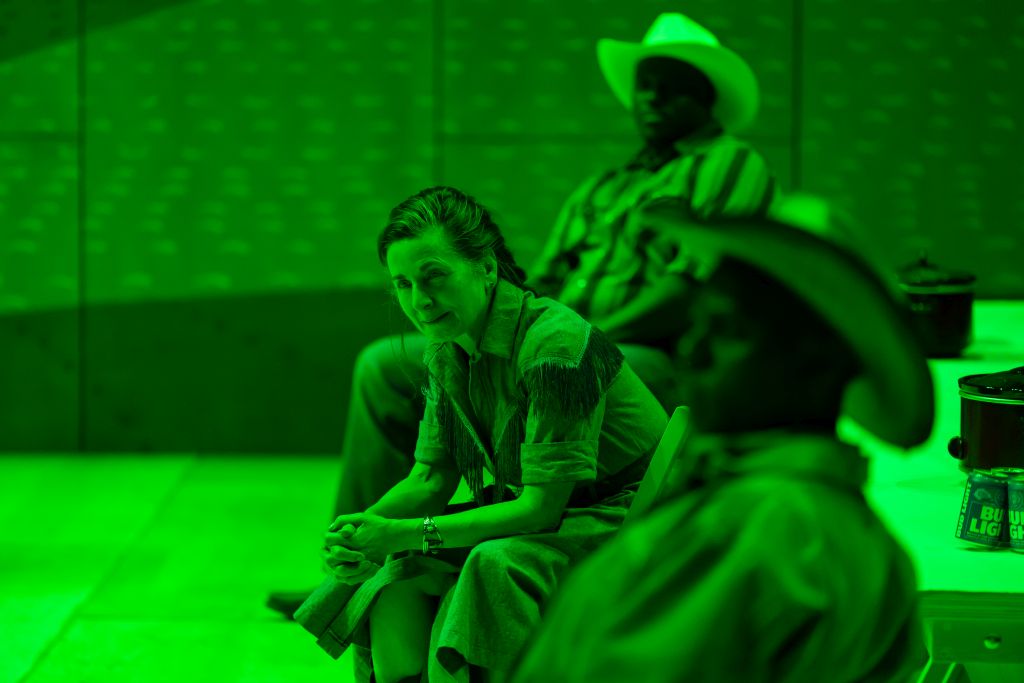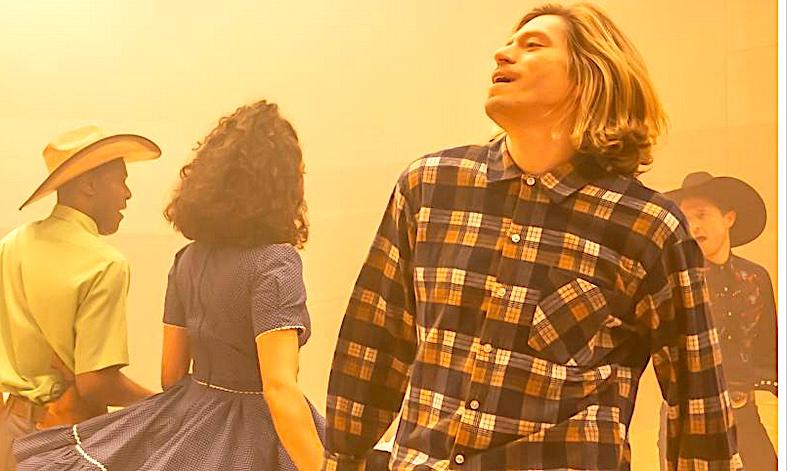No surreys, fringes or corny chap-slapping: the Rodgers and Hammerstein revival that has arrived at the Young Vic from New York, trailing a Tony award, is no ordinary makeover. Daniel Fish, its director, has spent the best part of 15 years stripping down and remodelling the 1943 original. The framework of the story — of farmers and cowmen in 1906 Oklahoma Indian Territory, poised to join the union and warring over their womenfolk — is still there. But its new engine takes it to exciting and violent places.
We enter the auditorium with the house lights on full beam. The room twice goes to blackout, twice to an eerie green, but it is mostly relentlessly bright, like a cloud-free sun. It is decked out as a wood-panelled hall, with rifles displayed in arty groupings on its walls and a long table down the centre, piled with corn husks. The band sit at one end, but there is no scenery of note. It’s part mead-hall, part laboratory. We are here to observe closely the behaviour of these characters, who sometimes observe us back with a wink and a grin. This is not really a production for purists, though anybody who relishes the wit and sheer beauty of the Oklahoma! score will not be disappointed. Fish gets at the dark heart of the story and finds a fresh narrative there.
 Gone is standard Broadway orchestration; instead, the seven players produce a captivating range of musical styles, from pedal-steel-guitar country crooning to finger-picked bluegrass and honky-tonk waltzes. The score’s much loved melodies shine through, but performed as the characters might have heard or sung them, even a capella for Laurey’s urgent "Out of My Dreams". Snatches of tunes are patchworked into other scenes like leitmotifs.
Gone is standard Broadway orchestration; instead, the seven players produce a captivating range of musical styles, from pedal-steel-guitar country crooning to finger-picked bluegrass and honky-tonk waltzes. The score’s much loved melodies shine through, but performed as the characters might have heard or sung them, even a capella for Laurey’s urgent "Out of My Dreams". Snatches of tunes are patchworked into other scenes like leitmotifs.
The cast of this transfer is mostly British, though two of the NYC cast have come over with it: James Davis as Will, the slow but decent cowman in love with Ado Annie (a barnstorming turn by Marisha Wallace, another American); and Patrick Vaill as Jud Fry, the hired hand with a sinister passion for his farm-owning boss Laurey (Anoushka Lucas, with Davis, pictured above). Vaill is a revelation. He has been performing this role since Fish first devised the show back at drama school, and it shows. His Jud is no burly brute; he’s fey-looking, wiry and wary, his lined face set in a scowl or a grimace of pain. Neither farmer nor cowman, he’s an outsider struggling for a place in this stratified community, and the full pathos of his loneliness hits home hard. It is the most powerful depiction of sadness you will see on a stage.
Jud’s heightened presence turns the emotional dynamics of the piece inside out. Laurey is being courted as usual by Curly the cowman (Arthur Darvill), but their on-off rom-com antics seem less significant alongside the emotional twister that is Jud Fry. Curly’s taunting of Jud in the song "Pore Jud Is Daid" rarely sits well in a sunnier production anyway; here it is performed in the dark, with the two men nose to nose as their faces are filmed close up and projected all over the back wall. Fish’s version doesn’t disguise Curly’s potential for viciousness, or the hint of homoeroticism in his treatment of Jud. Darvill sings him with a streak of lounge lizard, sometimes crooning his numbers in a Hank Williams falsetto, and adding an Elvis pelvic wiggle.
Sex is very much to the fore here, the apple-pie wholesomeness of the Hollywood version nowhere in sight. Only Ado Annie’s shotgun-toting dad (Greg Hicks) and Laurey’s Aunt Eller (Liza Sadovy, fresh from her Olivier win for Cabaret and pictured below) seem to have sprung from the tough frontier world of the original play, ending disputes with a gunshot. But the younger women are cut from contemporary cloth, sassy and brassy, sexy and sensual. In Act 1 they wear denim jeans and plaid shirts with big-buckled belts and regulation cowboy boots, like the locals do to this day.
 In Act 2, things turn nightmarish. The Dream Ballet featuring Laurey’s laudanum-inspired fantasies — originally choreographed by Agnes de Mille, here by John Heginbotham — becomes a piece of Sixties psychedelia in which a dancer (Marie-Astrid Mence) in a shiny minidress performs a gutsy solo in clouds of dry ice to a Hendrix-style electric guitar. After a great coup de theatre, the scene morphs into the box social, the men now in smart western shirts, the women in short dresses with exaggerated tutu skirts. There’s a whiff about it of Petrushka: the 1911 ballet about a fairground puppet show featuring a ballerina and her two rivals, a sad Harlequin and an aggressive Moor.
In Act 2, things turn nightmarish. The Dream Ballet featuring Laurey’s laudanum-inspired fantasies — originally choreographed by Agnes de Mille, here by John Heginbotham — becomes a piece of Sixties psychedelia in which a dancer (Marie-Astrid Mence) in a shiny minidress performs a gutsy solo in clouds of dry ice to a Hendrix-style electric guitar. After a great coup de theatre, the scene morphs into the box social, the men now in smart western shirts, the women in short dresses with exaggerated tutu skirts. There’s a whiff about it of Petrushka: the 1911 ballet about a fairground puppet show featuring a ballerina and her two rivals, a sad Harlequin and an aggressive Moor.
The denouement here is similarly tragic, though the echoes now are more Britten’s opera Peter Grimes with its community that closes ranks on those who don’t fit in. The world of Oklahoma!, we remember, is a new one, born of bloodshed and territorial rivalries, where violence is rarely far away. You leave still registering Jud’s roar of anger in the final scene, a punch to the heart.















Add comment